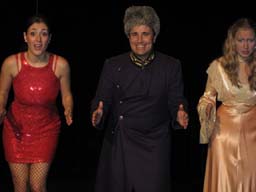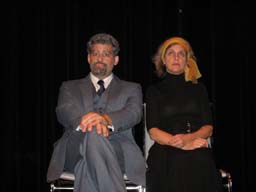
Paulanne Simmons
Chekhov and Jackson team up in "The Quick-Change Room"
"The Quick-Change Room"
Directed by Seth Duerr
Produced by RJeneration in association with
14th Strret Y and The York Shakespeare Company
14th Street Y; 344 East 14th Street
July 11 thru 15
Reviewed by Paulanne Simmons July 14.
Shows about backstage shenanigans abound in theater. One thinks immediately of "Noises Off," "Moon over Buffalo," "Stage Door." But there are plenty more. Most of the time these shows are all about who is sleeping with whom and who wants to sleep with someone else's partner. Not so with Nagle Jackson's "The Quick-Change Room." Or not exactly so.
 |
| Victoria Levin as Nina/Irina, John Dalmon as Nikolai/Vershinin and Elizabeth Kelly as Anna/Masha in "The Quick-Change Room." Photo from Picasa 2.0. |
Subtitled "Scenes from a Revolution," Jackson's play is the bittersweet and hilarious fictional account of what happens to one St. Petersburg Theater, the Kuzlov. There's all the usual backbiting and dreaming, but there's also much more. The actresses talk about waiting on line for stockings. The box office manager complains that he cannot get medical treatment for his son. Worst of all, everyone is worried because ticket prices have gone up, and the theater, for the first time since "the great patriotic war is not full."
The changing times that overwhelm all the characters offstage are brilliantly echoed in the show they are currently rehearsing, Chekhov's masterpiece, "The Three Sisters." Director and choreographer Seth Duerr does an outstanding job moving the play through its many scenes, onstage in Chekhov's play, offstage in Jackson's, highlighting how the quick-change room is the playwright's metaphor for the sudden transformation of Russia from a communist economy to free-for-all capitalism. While the long shadow of Chekhov underlines the truth that the more things change, the more…
As in most changes, there are winners and losers. The daughter of the wardrobe mistress Nina (Victoria Levin), who is elevated to company ingénue and the role of Irina, is a winner. Ludmilla Nevchenka (Michelle Sims, whose portrayal of Olga makes one long to see her in the actual "Three Sisters"), the long-standing company prima donna, who cannot sing and has no role in the updated revival of Chekhov's play, is a loser. The company's idealistic artistic director, Sergey Sergeyevich Tarpin (Seth Duerr, who bears a remarkable resemblance to Chekhov), booted upstairs by new management, is a loser. Boris (Michael De Nola), the cunning and practical box office manager who takes charge and cares nothing for artistic input, is a winner.
 |
| Seth Duerr as Sergey and Michelle Sims as Ludmilla. Photo from Picasa 2.0. |
Ludmilla is outraged when she is publicly insulted by Marya Stepanova (Robin Madel), the wardrobe mistress. She has little recourse however, because no one shows up at the workers' committee meeting when she makes her complaint. Marya's assistant, Lena (Marina Klochan), is delighted when her daughter gets a well-paying job at a hotel, until she finds out that this job means she will not permit her mother to stay in their new apartment where she is working in the evenings.
But no one, save the ambitious and ruthless Nina, is totally prepared for the changes Boris makes in "The Three Sisters" when he takes over. Seen from a comfortable seat in the 14th Street Y's theater, these "adaptations" are uproarious and too juicy to spoil by ruining the surprise. But even the most hard-hearted will be laughing through their tears.
By the time Gorbachev came to power, just about everyone had given up on communism. The characters in "The Quick-Change Room" all know that it is the "difference between the plan and life" that destroyed communism. Only Sasha (Tarek Khan), the stage electrician and Nina's sometime boyfriend, is still worried about being a good socialist.
But if Russia survived communism, it is clear Russians will
survive post-communism. Funny and sad, "The Quick-Change Room"
is filled with Russian irony and fatalism. Chekhov would have loved it.

| lobby | search
| home | cue-to-cue |
discounts | welcome | film
| dance | reviews |
| museums | NYTW
mail | recordings | coupons |
publications | classified |